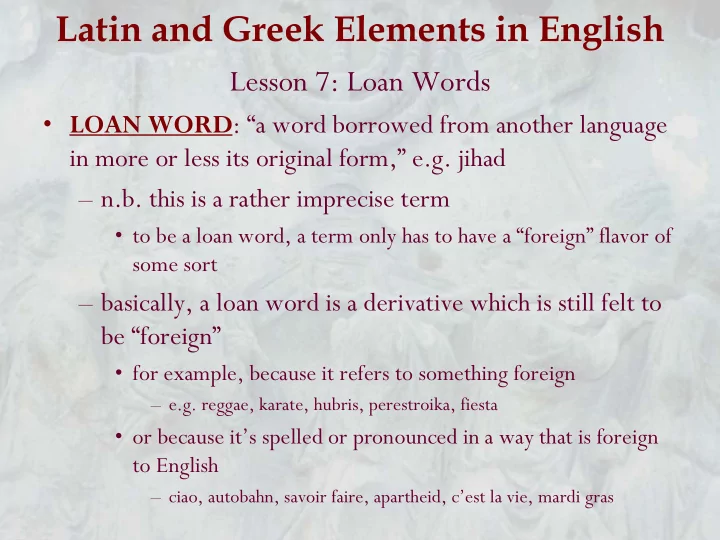

Latin and Greek Elements in English Lesson 7: Loan Words • LOAN WORD : “a word borrowed from another language in more or less its original form,” e.g. jihad – n.b. this is a rather imprecise term • to be a loan word, a term only has to have a “foreign” flavor of some sort – basically, a loan word is a derivative which is still felt to be “foreign” • for example, because it refers to something foreign – e.g. reggae, karate, hubris, perestroika, fiesta • or because it’s spelled or pronounced in a way that is foreign to English – ciao, autobahn, savoir faire, apartheid, c’est la vie, mardi gras
Latin and Greek Elements in English Lesson 7: Loan Words – actually, loan-words are words on their way to becoming derivatives • pattern: foreign word > loan-word > derivative • e.g. French phrase venez m’aider (“come help me”) – > m’aider (loan word) – > mayday (derivative) • that is, spell ciao as “chow” and the word is beginning to change from a loan word to a derivative! – why are there so many loan-words in English? • because loan-words make you sound like a cool and sophisticated globetrotter and multicultural connoisseur – when you’ve only ever left Utah once and that was to go to Idaho!
Latin and Greek Elements in English Lesson 7: Greek Suffixes • Greek suffixes operate much the same way as their Latin counterparts – some are even the same as those in Latin • e.g., -al, -ic, -tic – these suffixes are cognates because Latin and Greek are “sister” languages in the Indo-European linguistic family • just as in Latin, Greek suffixes are grouped into categories: noun-forming and adjective-forming – also as in Latin, there are very few verb-forming suffixes • most BASES are verbs to begin with • actually there is only one Greek verb-forming suffix: -ize
Latin and Greek Elements in English Lesson 7: Greek Suffixes • one important difference between Latin and Greek suffixes: – Latin is full of ADJECTIVE-forming suffixes – whereas Greek is full of NOUN-forming suffixes • and some of those noun-forming suffixes are highly specialized, e.g. – -phobia: “abnormal fear of” – -logy: “science of” – -ectomy: “surgical operation for removing” – -crat: “one who advocates or practice rule by” – this is part of the modern tendency to use Greek for the creation of new technical and scientific vocabulary
Recommend
More recommend